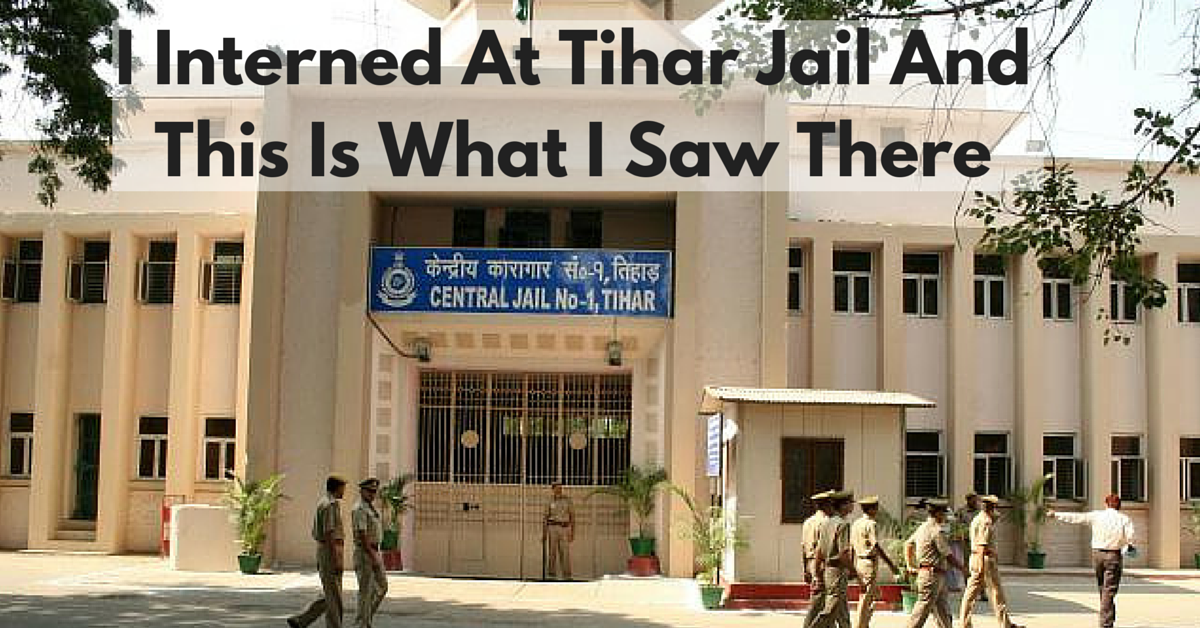Dhruv Dhawan, a law student, interned at Tihar Jail for some time. We asked him about his experience, and this is the story he shared. Over to Dhruv.
Tihar Prisons, also called Tihar Jail and Tihar Ashram, is the largest complex of prisons in South Asia. Run by Department of Delhi Prisons, Government of Delhi, the prison contains nine central prisons, and is one of the two prison complexes in Delhi, along with a district prison at the Rohini Prison Complex. The prison is styled a correctional institution. Its main objective is to convert its inmates into ordinary members of society by providing them with useful skills, education, and respect for the law. It aims to improve the inmates’ self-esteem and strengthen their desire to improve. To engage, rehabilitate, and reform its inmates, Tihar uses music therapy, which involves music training sessions and concerts. There is also a prison industry within the walls, manned wholly by inmates, which bears the brand Tihar.
For the reformation of Prisoners, jail works in 3 ways
1) Educational program (Padho Aur Padhao Scheme, NIOS centre
2) Vocational program (80 different of courses);
3) Meditation program (Art Of Living, Yoga, etc.).
During the internship, I learned about “FURLOUGH FACILITY”. FURLOUGH is a kind of leave given to convicted prisoner in which he is allowed to leave the jail on the ground of good conduct. According to guidelines given in Delhi jail Manual A prisoner who is sentenced to 5 years or more or rigorous imprisonment, but has undergone 3 years of imprisonment excluding remission can be released on furlough.
The jail runs many humanistic schemes for improving the conditions of the prisoners. SPARSH SCHEME is one of these schemes in which the Prisoners whose relatives didn’t come for Mulaqat for more than a month are provided with Rs 500/- per month in their account which they can use for purchasing things from canteen in jail premises through their smart card also meet the travel expenses when they are released on parole or furlough. This money which is deposited in accounts of prisoners in Sparsh Scheme is borne by Prisoners Welfare fund.
The jail has a Legal Aid cell which is visited by Lawyers from Delhi State Legal Service Authority. Inmates can visit Legal Aid Cell if they have any queries about their cases. The Lawyer there listens to them and suggests them what best in their interests. Many NGOs also makes visits to jail and provide legal facilities to the inmates. The Jail Administration has no control over the lawyers provided by Legal Aid Council for better and fast disposition of justice Jail Authorities. The NGOs should be encouraged which provide such Legal Services and should attract more such NGO’s to help Jail Administration.
Smt. Sheila Dikshit, former Chief Minister of Delhi inaugurated the Vocational Training Institute in Central Jail No.02, Tihar on 13th Oct. 2009. She described it as a landmark step for the reformation & rehabilitation of prisoners. The Institute provides short term training varying 60 hours to 720 hours. The Prison Administration has identified and imparting 80 Modular Employable Skill (MES) courses in 14 sectors as under: Automobile Repairs, Beauty Culture & Hair Dressing, Carpet, Electrical, Fabrication, Garment Making, Hospitality, Printing, Refrigeration & Air-conditioning, Construction, Woodwork, Khadi, Food processing & preservation, Indian Sweets – Snacks & Food. The trainee inmates are assessed by an independent assessing body appointed by the Ministry of Labour & Employment, Govt. of India every three months.
Certificates for courses are completed successfully are awarded to trainees by the National Council for Vocational Training (NCVT) and do not bear the name of the Central Jail, Tihar. Trainee inmates are imparted training by qualified and experienced members of the faculty in their respective trades.
They are provided with all requisite study-material, stationery items and material for conducting practical training free of cost. As motivation, trainee inmates are refunded their course fee & testing fee, upon successfully completing the course.
Tihar Jail became the first jail in the country to have its very FM radio station when Director General of Prisons Vimla Mehra launched the ‘TJ FM Radio’ at Central Jail No 4 in the Tihar complex.
The FM Radio has been established to meet the twin objectives of entertainment and training of prisoners as Radio Jockey (RJ). We can say that India has seen how humane means cut through better than the crack of a whip.
 Serato DJ Crack 2025Serato DJ PRO Crack
Serato DJ Crack 2025Serato DJ PRO Crack








 Allow notifications
Allow notifications


